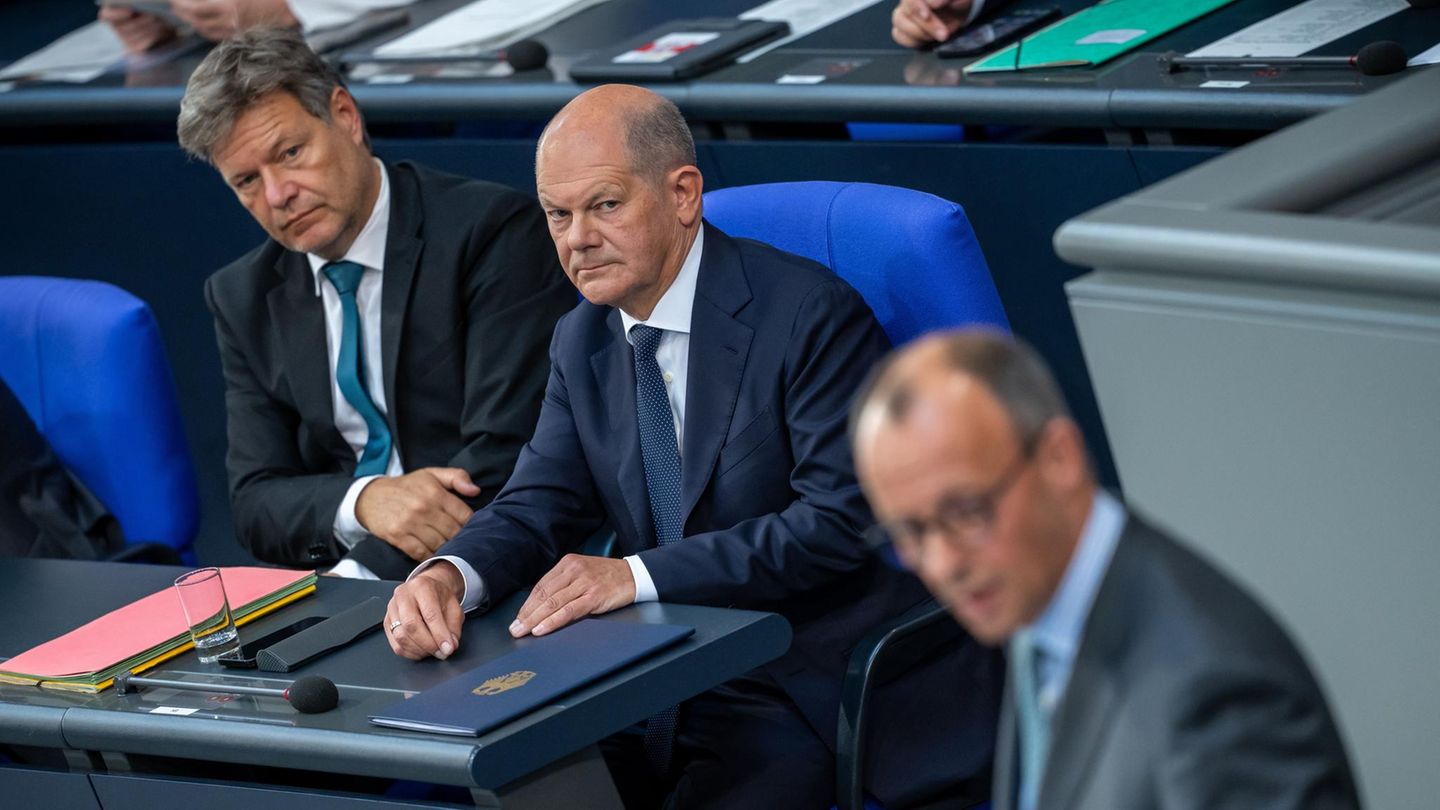Election campaign
Union, SPD and Greens: Who actually wants what?
Copy the current link
After the vote of confidence comes before the election: the Union, SPD and Greens explain how they want to score points. An overview.
Foreigners, taxes, the economy and arms deliveries: the day after the vote of confidence, the focus is on highly emotional topics. The Union, SPD and Greens present their programs for the upcoming federal election in Berlin. The election date of February 23rd is considered certain, even if it is still up to Federal President Frank-Walter Steinmeier to schedule the election.
Union, SPD and Greens in election campaign mode
The candidates are likely to highlight key points from the drafts in Berlin. Those who want to appear one after the other at different locations – in this order – include Green Party candidate for chancellor Robert Habeck, CDU candidate for chancellor Friedrich Merz and the SPD candidate for chancellor and incumbent chancellor Olaf Scholz. They are each accompanied by other top politicians.
In terms of content, the emphasis differs – from the promise of lower electricity taxes and network fees with the Union to setting the course for economic recovery and affordable living with the SPD. For the Greens, the socially acceptable design of climate protection is the focus. The course taken by Scholz and Merz in Ukraine policy is very different.
Taxes/debt brake
All three political forces promise relief. The SPD for 95 percent of all taxpayers – without giving any details. The CDU and CSU want to gradually reduce the income tax rate. The top tax rate of 42 percent should only apply to higher incomes. The Greens want a higher basic allowance up to which no income tax is due. The SPD and the Greens want to ask people with high assets to pay more.
The Union would like to abolish the solidarity surcharge. The SPD wants to keep it for the richer people, the Greens want to integrate it into the income tax. The SPD is promising a lower VAT for food, the Union for food in restaurants. When it comes to the debt brake, the SPD and the Greens work in a similar way: the Union wants to stick to it – the SPD wants to introduce exceptions for investments that enable the Greens to do so.
Social/Pension
Minimum wage of 15 euros: This is what the SPD and the Greens want – some in 2026, others a year earlier. In both cases, some points are aimed at strengthening employees, such as the end of fixed-term employment contracts without objective reasons for the SPD or the curbing of corresponding jobs for the Greens. The CDU/CSU, on the other hand, want to score points with ideas for “the hardworking” – such as tax-free overtime bonuses. “Anyone who wants to work more voluntarily should have more net of their gross,” says their draft.
Friedrich Merz and his party alliance want to abolish the name “citizen’s money” – their “new basic security” is intended to place a much greater focus on job placement. There should be more work incentives. The Union strictly states: “If someone is fundamentally unwilling to accept work, (…) basic security must be completely eliminated.” All three parties are sticking to the retirement age as currently regulated. The Union wants a stable pension level and further increasing salaries.
Pensions are a central issue for the SPD and the Greens. Both parties want to set the pension level at 48 percent. The Greens are also proposing a citizens’ fund: loans and the federal government’s own funds will be used to invest sustainably and in a climate-friendly manner in European and German companies. The income should be used to strengthen lower and medium pensions. The whole thing is somewhat reminiscent of the generational capital of the now failed traffic light pension reform. However, the income there was intended to dampen the sharp increase in pension contributions expected in the coming years.
Economy/economic situation
“Performance must be worth it again,” says the Union. More flexible rules, simplifications and less bureaucracy should make Germany run faster again. As a “protective shield for our economy”, the Union is announcing, among other things, instruments against subsidies that distort global competition. Electricity and heating networks, charging stations and apartments are to be built on a large scale by the SPD – funded by a so-called Germany Fund. A loan-financed German fund should also help the Greens, for example for the rail network, daycare centers or innovation incentives.
migration
This is an urgent issue for the Union. She wants a de facto stop in accepting illegal migrants immediately. Anyone who enters from an EU or Schengen country to apply for asylum should be turned away at the border. “Our country needs a fundamental change in migration policy,” says the CDU/CSU. They promise quick asylum procedures and “consistent implementation of asylum decisions.” Although the SPD advocates “quick and consistent deportations,” it prefers the voluntary return of migrants without the right to remain. The Greens are committed to a “fair, binding and solidarity-based distribution of those seeking protection in Europe”. The needs of women, children, queer people and the disabled must be taken into account.
Ukraine/Russia/Bundeswehr
There are big differences here. The SPD wants to continue arms deliveries to the country attacked by Russia “with prudence and a sense of proportion” and “for as long as necessary”. But Germany should not become a war party. The SPD does not want to deliver the Taurus cruise missiles requested by Ukraine – contrary to what Merz had suggested under certain conditions. Scholz also reiterated: German weapons should not be used to fire deep into the Russian hinterland.
Merz and the Union are setting a different accent here. The Union sees Russian President Vladimir Putin’s campaign in Ukraine in the context of the fact that Moscow’s rulers want “a new world order according to his rules.” “Security for Germany and Europe, in peace and freedom: This is of paramount importance to us. (…) If Ukraine falls, there is a risk of an attack on another European country.” The CDU/CSU promise Ukraine all the support it needs. After an election victory, the Union wants Germany, France, Poland and England to jointly develop security guarantees for Ukraine in coordination with the USA.
The Union, like the SPD and the Greens, emphasizes that a peace process must be able to be conducted by Ukraine on an equal footing. The Union is also in favor of increasing conscription, the SPD rejects the reintroduction of compulsory military service, but wants to introduce a “new, flexible military service”. The Greens want to make voluntary military service and the reserve more attractive to a broad target group.
DPA
yks
Source: Stern
I have been working in the news industry for over 6 years, first as a reporter and now as an editor. I have covered politics extensively, and my work has appeared in major newspapers and online news outlets around the world. In addition to my writing, I also contribute regularly to 24 Hours World.




